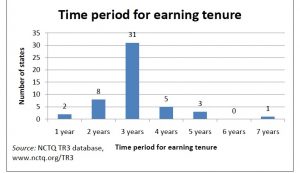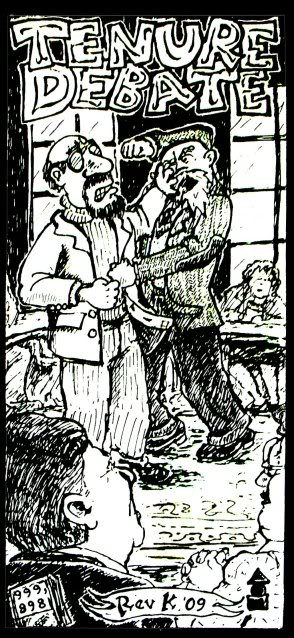 Once again, teacher tenure is a controversial subject. I recently read that teacher tenure in California was deemed unconstitutional because nine students argued that job protections made it virtually impossible to dismiss low-performing teachers by citing Brown v. Board of Education. This ruling affects K-12 teachers in public schools throughout the United States and will undoubtedly be in the appeals court for years to come.
Once again, teacher tenure is a controversial subject. I recently read that teacher tenure in California was deemed unconstitutional because nine students argued that job protections made it virtually impossible to dismiss low-performing teachers by citing Brown v. Board of Education. This ruling affects K-12 teachers in public schools throughout the United States and will undoubtedly be in the appeals court for years to come.
In North Carolina, teachers have not had a raise in 6 years. The offer in the 2014 budget is for teachers to receive a 5% raise and keep tenure or an 11% raise if they give up tenure. By 2018 it’s proposed that previously earned tenure is to be phased out; however, a Superior Court judge ruling that teachers couldn’t lose a right they’ve earned blocked the bid. North Carolina is one of 29 states in which tenured teachers can be dismissed because they are rated unsatisfactory.
In 1977, Oregon abolished tenure to replace it with a 2-year renewable contract and a rehabilitation program for teachers that are regarded as unsatisfactory.
Florida is the only state that succeeded in eliminating teacher tenure protections.
Kansas’ lawmakers recently stripped teachers of their tenure rights in the summer of 2014, but enabled tenure to be negotiated by local school districts.
In 2012 Gov. Christie (New Jersey) signed the Tenure Reform Bill renewing the tenure law while protecting due process procedures for tenured employees.
The states of Idaho, Illinois, Indiana, Ohio, New York, and Pennsylvania will also be affected by court rulings on tenure.
Teacher tenure for K-12 teachers in public schools started around the same time as the labor struggles in the 19th century with auto and steel workers. Teachers demanded protection from parents and administrators who placed conditions in lesson plans or excluded controversial reading material in the classrooms.
Originally, tenure was a due process guarantee to work as a check against teachers being fired and replaced with friends or family members. It also protected female teachers from getting dismissed for marriage, pregnancy, wearing pants, or being out too late in the evenings.
Tenure is acquired, in most states, by teaching for three consecutive years in the same school and achieving a satisfactory evaluation. The years vary from state to state. Probationary years are the years before tenure at which time a teacher can be terminated if ratings are unsatisfactory. Once tenure is granted, it protects all teachers with due process. It doesn’t guarantee lifetime employment but protects from firings over the high salaries of experienced teachers for a low salaried new teacher or any other unjust reason.

It is contended that tenure encourages complacency because educators do not fear losing their job. There are no data to prove this correct.
Tenure permits teachers to advocate on the behalf of students and openly disagree with parents, politicians, and administrators. More effective work environments are created because there is no fear of losing a job.
All students deserve great teachers. School districts need to attract, train, and nurture talented people to the profession. Eliminating tenure is not the way to dismiss an ineffective educator. If a teacher is unfairly fired due to the elimination of tenure, another problem is created – unjust dismissals. Who then, will address this problem? Districts need to look at the way teachers are being evaluated, devise a method that develops novice teachers to be competent, bring forth expertise in seasoned teachers and leave tenure alone.

Truth be told, there are very few ‘bad’ tenured teachers in the classroom today. Most bad teachers don’t remain in the classroom long enough to become tenured because they move on to other fields where they meet success. Removing tenure does not eliminate incompetency – better evaluating systems will do the job along with high quality professional development. The latest statistics from the National Center for Education Statistics show less than 1 percent of teachers are dismissed both in North Carolina and across the country because of a poor performance. We need to keep teachers protected with tenure.



